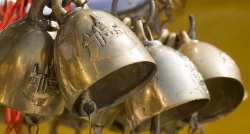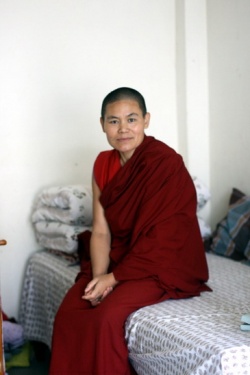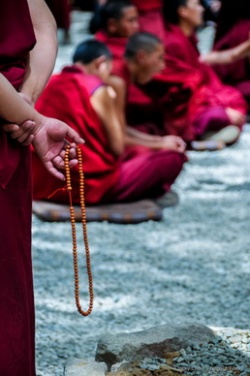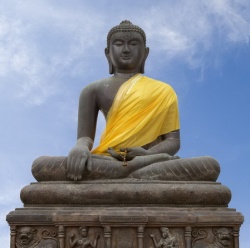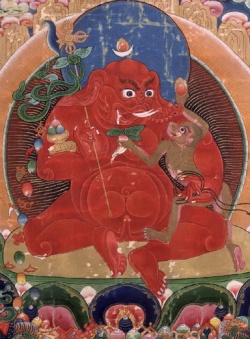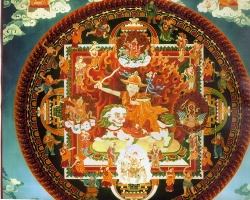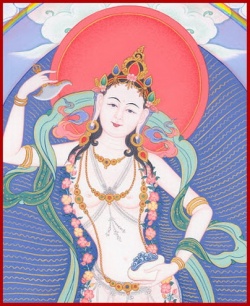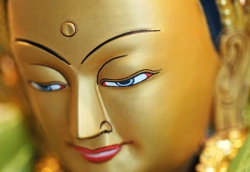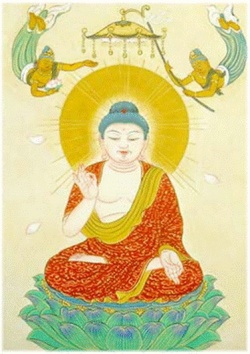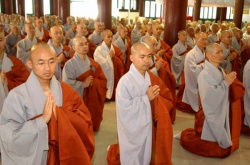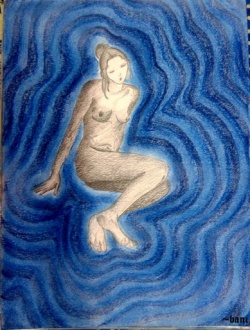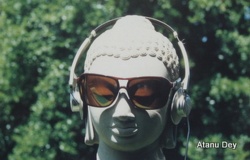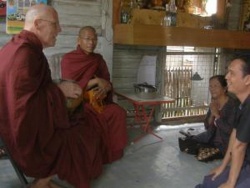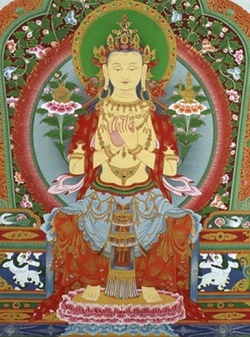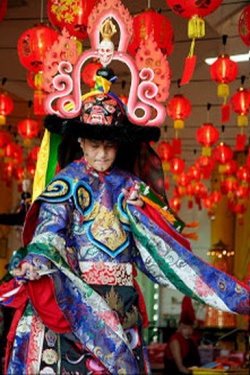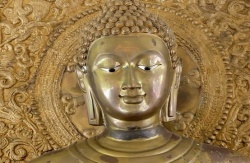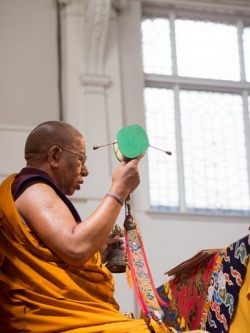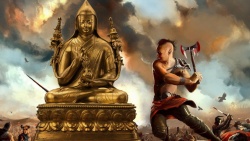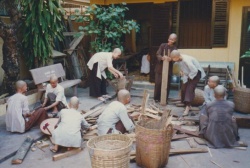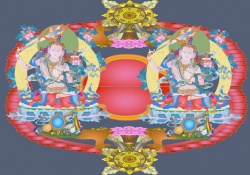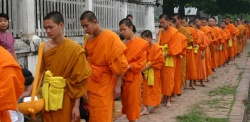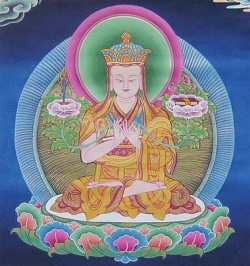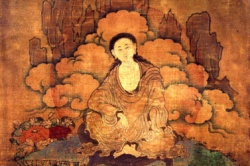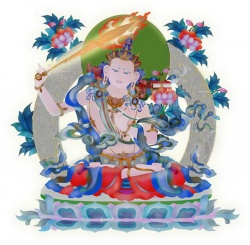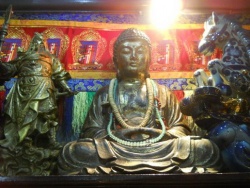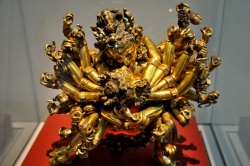Dasaparamita (The ten perfections)
Dasaparamita( The ten perfections)
Introduction
Here Parama means the noblest, highest, or most excel-lent. Therefore Paramitas are the most excellent virtues, or the noblest qualities of the Bodhisattas. In other words Paramitas are the line of conduct or the Pre-requisites for Enlightenment.
These ten virtues should be practised by every Buddhist who wishes to attain Nibbana - the final Emancipation, through any Yana or vehicle. Nibbana can be reached through one of the following three Yanas:
l. Samma Sam Buddhahood 2. Pacceka Buddhahood 3. Arahantship
SAMMA SAM BUDDHA
Every Buddhist has a freedom to choose one for himself from the above mentioned three Yanas which is suitable for him according to his temperaments and intellectual capacity in order to attain Nibbana. Here Samma Sam Buddha means fully Enlightened One, the Perfert One, the Holy One, the Omnisrient.
In this world, the appearance of a Samma Sam Buddha is a very rare rhance. In comparison with the other Yanas, it is an extremely difficult one. A person who aspires to become a Buddha, at first, should make a firm mental resolution and verbal expression for his object in the presence of the Buddhas. Then he must receive the proclamation or nomination from a Buddha who will publicly declare him to become a Samma Sam Buddha in the future.
Our Buddha, when he was born as Sumedha Pandit, four Asankheyyas and one hundred thousand, 1 Kalpas-aeons ago, received the assurance from the Buddha Dipankara that he would undoubtedly become a Buddha in future.
Thus becoming a fully entitled Bodhisatta, he renounced his personal salvation, began to practise the ten perfertions, with the self-sacrificing spirit to serve the suffering humanity and finally became Samma Sam Buddha.
PACCEKA BUDDHA
The second Yana, to reach Nibbana is Parceka Buddha-hood. Pacceka Buddha is one who attains Enlightenment without any spiritual assistance from outside sources. He does not possess the faculty to enlighten others. During the dispensation of a Samma Sam Buddha, Pacceka Buddhas do not appear. Only one Samma Sam Buddha arises at a time but several Pacceka Buddhas can appear at the same time. To become a Pacceka Buddha, one should practise ten perfections for a number of Kalpas.
ARAHANT
The third Yana to reach Nibbana is the Arahantship. This path is comparatively an easy one, and it is open to both men and women. Arahant is the one who has completely eradicated all the defilement including the ten fetters and the one who is worthy of offerings and reverence. As he has attained the ultimate realization, he is also capable to render the spiritual assistance to others for their liberation. Therefore the attainment of Nibbana through even this Yana cannot be regarded as selfish ideal.
To become an Arahant, one should have to fulfil the ten perfection for many series of births.
Dana-charity (First paramita-First perfection)
‘Dana’ literally means giving or offering one’s possessions with pure mind for the welfare of others. The one of the main objects of ‘Dana’ is to subdue the immoral thought of selfishness, miserliness or excessive craving which creates suffering in Samsara.
Another object is to develop the meritorious thoughts of selflessness, doing service to others. A real donor does not expect anything - name, reputation or even the word of ‘Thank’, in return from the recipient. He does not look down on the recipient as his debtor for the service he has rendered. He does not give through fear or shame and never repents for his charity. He gives voluntarily, realizing the Kamma and Vipaka - the cause and effect.
Naturally, as the result of his noble deeds of charity, he will enjoy a happy, fortunate and prosperous life, wherever he will be reborn in Samsara and this perfection of generosity leads him towards the final Emancipation.
THE STORY OF KING VESSANTARA
Once, our Bodhisatta (Sakyamuni Gotama Buddha when he was a Bodhisatta) was conceived in the womb of Queen Phusati, the Chief Consort of King Sanjaya. During her pregnancy, Queen Phusati had a strong desire to do charity. Accordingly, the King ordered six alms-halls (Dana Sala) to be built and everyday the Queen gave alms to Monks, the poor and beggars, spending six hundred thousand Kahapanas.
After ten months, the Queen gave birth to a son and he was named Vessantara and wonderful things happened on that day. When the infant Prince asked for gifts to practise charity the Queen handed over to him a purse containing one thousand Kahapanas. At the same time, a female elephant brought a white baby elephant to the Palace and left it in the Royal stable. This was considered a good omen.
The King appointed sixty nurses to look after the Prince and he made a necklace worth a thousand Kahapanas for the Prince who was then only five years old. The Prince who had a strong desire to practise charity, gave his valuable necklace to a nurse. In this way the King made nine necklaces and each time the Prince gave it away.
At the age of sixteen, Prince Vessantara having mastered all sciences, married a beautiful Princess Maddi Devi. When he was proclaimed King of Sivi, he practised charity to the highest state of perfection. He also built six alms-halls and spent six hundred thousand Kahapanas as charity a day. They led a happy married life and later had a son - Jali and a daughter - Kanhajina.
In the Kingdom of Kalinga, there was a great famine and severe drought. The citizens requested that the white elephant of King Vessantara, considered of good omen, be brought to Kalinga. Vessantara readily agreed and presented the elephant to the citizens of Kalinga when they approached. Vessantara requested his father’s permission to perform ‘Satta Satika Dana’ (i.e. offerings of material things each to a limit of 700).
After the grand celebrations, King Vessantara together with his Consort and two children left the city for Mount Vamka in the Himalayas where the Sakka Deva Raja built a hermitage for them to stay. Before reaching their destination, he willingly dispensed with his four horses and a chariot to Brahmins who asked for them. So they had to walk for the rest of their journey to the hermitage.
They reached the place and lived on wild fruits and roots gathered by Queen Maddi, for seven months. Eventually, King Vessantara whose whole intention was to do charity, had to give away his two children to an old Brahmin - Jujaka who wanted them to assist his wife at the house chores. Sakka finally tested his degree of charity in Vessantara. by disguising himself as a Brahmin and asked for his wife.
The Queen accordingly replied, “From maidenhood I was your wife and you my master still. Let you to whom so you desire give or sell or kill.” Vessantara was perforced to depart his wife to the Brahmin, but the latter gracefully returned the Queen to King Vessantara.
In this way, our Bodhisatta practised Dana Paramita to the highest degree of perfection.
Sila (morality) - (Second paramita-Second perfection)
Sila is morality, good conduct or the observance of precepts. Sila is the foundation of all the meritorious deeds because good behavior is the beginning of the life of purity. Of all the schemes of Buddhist trainings, Sila is the most important preliminary step towards the progress of spiritual life.
It is compared to a golden ship by which one can cross the ocean of Samsara. Without Sila, there is no Samadhi - concentration or meditation. Through lack of Samadhi, Panna or spiritual advancement cannot be achieved. In other words, one must have a solid foundation of Sila, practising at least Five Precepts before starting meditation. Then only can one cultivate Samadhi - one pointedness of the mind which leads one to higher wisdom, the third stage, on the way to Nibbana.
Sila can be divided into two categories namely : Caritta Sila and Varitta Sila.
CARITTA SILA is morality consisting of performances. All those moral instructions which the Blessed One introduced ‘should be done or followed’. In other words all the ethical rules which are in the positive form should be included in Caritta Sila. Fulfilling one’s duty towards one’s parents, wife and children, respecting the elders, ministering of patients, helping the poor and the needy and observing good manners, etiquette, etc., such form of ethical teachings given by the Buddha can be regarded as Caritta Sila.
VARITTA SILA is morality in avoidance. The avoidance of those evils, killing, stealing etc. which the Buddha stated ‘should not be done’. All the precepts which are in negative forms can be included in Varitta Sila. In Buddhism, there are various precepts such as Five, Eight and Ten, out of which the Five Precepts should be practised in one’s daily life and the Eight Precepts on Uposatha days or Sabbath days. Although the Buddhist precepts are not commandments, they should be observed at one’s own free will for the peace, happiness and welfare of the individual and society at large.
THE STORY OF THE DRAGON
The Bodhisattva (Sakyamuni Gotama Buddha when he was a Bodhisattva) was once born as a dragon - Samkhapala. He lived in the Realm of Dragons (Nagaloka). As he was not satisfied with his state of life, he used to come to this world to observe the Precepts. On New Moon and Full Moon days, he regularly observed the Eight Precepts and went back to his realm on the following day.
One Holy Day, transforming into a large snake he coiled round an ant-hill at the wayside with the thought: Let those who wish, make use of my skin, flesh, or bones.
On that day, sixteen hunters with stakes in hands were returning without any game. Seeing the serpent king, they went up to him to kill and eat his flesh. At first they weakened the snake by beating it with their stakes and weapons. The serpent did not get angry. He could have killed them all easily, but he did not want to break his precepts even at the risk of his life. He gladly bore all that suffering, without any ill-will towards them. Placing his head inside his coils he lay still, allowing them to do any harm they liked.
Having weakened the reptile, they tied it with ropes and carried it on their shoulders. As the head was dropping down, they pierced the nostril and passing a string through it, hung the head up and carried him, causing much pain. The suffering creature did not even look at them with an angry face.
A rich merchant named Alara, who was passing by with about 500 carts, saw the pitiful state of the poor reptile. Moved by compassion, he gave various presents and money to the hunters, and saved the good serpent-king.
After his Enlightenment the Buddha said: “Though I was pierced by stakes and hacked by weapons, I did not get angry with the hunters. This is my Perfection of Morality.”
‘Nekkhamma’ (renounce worldly pleasures) - (Third paramita-Third perfection)
Nekkhamma’ means to give up or to renounce the worldly pleasures. In other words, it means retirement into solitary life, in search of the highest truth and peace. It is not easy for a worldly man to give up his possessions and the sensual enjoyments at once unless he realizes the real nature of life through his own bitter experience.
The Bodhisattas find that the household life is full of responsibilities and burdens. They regard the homeless life like the open sky free from worldly ties. Naturally, they lead a solitary life and easily realize that all the sensual pleasures in this world are transient, profitless, ignoble, fleeting like a flash of lightning or like a tiny dew-drop on a blade of grass.
Thirst for sensual enjoyment is insatiable and unquenchable. The more one enjoys the thirstier for mundane pleasure one will become. It is like drinking salt water that will never quench the thirst. It also can be compared to the act of licking a honey-drop on the edge of a sharp sword.
That is why Bodhisattas realize the vanity of material pleasures and seek delight in `Nekkhamma' to get rid of the worldly fetters on their way to Enlightenment.
THE STORY OF THE KING MAKHADEVA
Long, long ago the Bodhisatta was born as the eldest son of a great king and was named Makhadeva. After his father's death, he ascended the throne and ruled the kingdom righteously.
With the march of time, he became wiser and wiser. He had no liking for his royal pleasures for he realized their vanity. His desire was to leave the world and retire to the forest to meditate.
One day he asked his barber to tell him if ever he would see a gray hair on his head. The king grew old and his black hair changed. The barber noticing a grey hair on the head told the king. When he was asked to show it, he rotted it with a pair of golden pincers and placed it on the king's hand. The wise king seeing it, thought that it was time for him to renounce the world as he was overcome by age.
He ordered all his ministers and the people to assemble and said:
"Oh dear people, I see a gray hair on my head. As I am now getting old, please understand that I will leave the world and go to the forest to meditate." Nobody was able to prevent him from renouncing the world. Whilst his Queens, children and people were all weeping, he left the palace, and went alone to the Himalayas with no attachment to anything.
After His Enlightenment the Buddha said: "Like a drop of saliva did I renounce the Kingdom which I posses. In renouncing there was no attachment. This is my Perfection of Renunciation."
‘Pañña’ (wisdom)-Fourth paramita-Fourth perfection”
‘Panna’ is wisdom, right understanding or insight. It is not mere wisdom or knowledge, but it is the wisdom which leads to the complete realization nf truths. Panna is the light of truth that brightly illuminates the knowledge, destroying the darkness of ignorance. Panna is the most excellent eye with which one can visualize the objects or possibilities that cannot be seen with the naked eye.
Bodhisattas who practise Panna Paramita, endeavour to develop their wisdom in every possible source. They do not feel ashamed to ask questions to clear out their doubts or to gain knowledge from anyone wiser than them, regardless of his social status, caste, creed or colour. They do not wish to exhibit their knowledge, or to hide their ignorance in public with ulterior motives. Panna can be divided into two classes namely: Lokiya Panna and Lokuttara Panna.
LOKIYA PANNA - Mundane wisdom.
All those ‘Puthujjanas’ - worldly people who have no attained the fair stages of sainthood can acquire the mundane wisdom. Mundane wisdom which also gradually leads one to the supra mundane state can be developed in the various ways, such as learning the different Arts and Sciences, listening to the Dhamma, associating with the wise, engaging in profitable conversation, discussion and debates, reading widely and traveling far and wide.
LOKUTTARA PANNA - Supra-mundane wisdom.
All those who have attained the four stages of sainthood can achieve the supra-mundane states of wisdom. This state of wisdom can be developed with the realization of the Four Noble Truths and the Law of Dependent Origination through the attainment of the Four Paths and Fruitions.
To achieve this super-normal state of wisdom, one should have a wider experience in the highest stage of meditation, particularly on the Three Characteristics of life or on any other suitable meditative subjects, according to one’s temperaments. Bodhisattvas go through the most severe course of mental culture to fulfill the perfection of Pañña, for the attainment of Enlightenment.
THE STORY OF PANDIT SENAKA
In the course of his wanderings in SAMSARA, the Bodhisattva was born as Senaka in a Brahmin family. He was very wise and advised people constantly with regard to their material and spiritual welfare. At that time there was an old Brahmin who had earned a thousand gold coins. He gave this money to a certain family for safe custody.
Unfortunately, as the members of the family spent the whole amount for their own needs, they gave a young maiden in marriage to him. The old Brahmin was pleased with this exchange. The couple lived happily for some time. Later, the wicked woman, wishing to live as she liked, forced her old husband to go fetch a servant girl. She prepared and gave him some fried rice and flour as provisions for the journey.
The poor old man, putting them inside a bag, left his house and wandered from place to place to collect some money. One day as he was hungry, he rested at the foot of a tree and opened his bag to eat some food. He ate a little and, leaving the bag open, went to a stream close by to drink some water. Just then a snake, sensing the smell of flour, crept into the bag. The Brahmin returned, and unaware of the poisonous snake, closed the bag and carried it.
A certain tree deity, in order to make known the wisdom of the Bodhisatta, said: “O Brahmin, if you go home, your wife will die; if on the way you remain, you will die.”
The frightened Brahmin did not know what to do. He could not understand the meaning of those words. Luckily it happened to be a full-moon day. People had gathered in large numbers to listen to the teachings of Pandit Senaka. The worried Brahmin went to the hall and sat crying in a corner.
Pandit Senaka saw him crying and made inquiries. As if he saw everything with his Divine Eye, he understood what actually had happened. He ordered a person to bring a long stick and open the bag. Just then the hiding snake slowly crept out. People drove the snake out without harming it, and the poor Brahmin was saved by the wisdom of the Bodhisatta.
After His Enlightenment the Buddha said : “Investigating by wisdom, I then saved the Brahmin, In wisdom there is no equal to me. This is my Perfection of Wisdom.”
`Viriya' (Perseverance) (fifth paramita-fifth perfection)
`Viriya' literally means virility, perseverance, effort or energy. It does Iiot mean the physical energy but mental vigor which is one of the most prominent characteristics of Bodhisattvas,
`Viriya' is also one of the `Indriyas' - Spiritual faculties, `Balas' - Mental powers and `Bojjhangas' - the factors of Enlightenment, out of the thirty-seven principles leading to the Buddhahood.
The person who has `Viriya' does not withhold his undertaking half-way on account of the obstacles, disappointments or laziness. He does not postpone his work that is to be done today until the next day. He does not waste his precious time. He begins his work straightaway without waiting for opportunity to crop up, looking for auspicious time or gazing at the stars. He never tries to escape from his day-to-day activities by giving his numerous reasons such as cold, hot or rain.
The energetic person considers that it is a sign of sure success when he fails in his undertaking. He redoubles his effort when he meets oppositions. He increases his courage when he faces obstacles. He works hard day and night looking forward to his goal until he succeeds.
Our energetic Bodhisattva exercised his `Viriya' up to the highest degree when he was fulfilling the ten perfection. Even during his last birth while he was struggling for the Enlightenment, the Monk Gotama told the Mara who advised him to give up his effort, "Death in battle (with passions) is more honorable to me than a life of defeat."
The Monk Gotama, even for the last moment, just before the attainment of Buddhahood, while sitting down beneath the Bodhi Tree, practiced `Viriya' by making a firm resolution. "Though only my skin, sinews and bones remain, and my blood and flesh dry up and wither away, yet never from this seat will I stir, until I have attained full Enlightenment."
THE STORY OF JANAKA
Long ago the Bodhisattva, born as an adventurous merchant named Janaka, journeyed the high seas in search of wealth. Unfortunately in mid-ocean the ship was wrecked. Some who attempted to swim perished, and a few implored gods for help. But the energetic Bodhisattva, relying on himself, besmeared the body with oil and climbing the mast jumped far out into the sea beyond the reach of the fish that had collected near the wrecked boat to eat the flesh of drowning men.
For seven days he courageously swam though no shores on both sides were visible to him. On the eighth day, as usual, even in mid-ocean he resolved to observe the Eight Precepts.
A goddess, seeing him thus struggling for life, appeared before him and offered him a dish of food. As it was after mid-day, and he was fasting, he thanked the goddess and declined the offer though he was fasting for more than seven days. To test him, the goddess spoke discouraging words to him and said that he was only making a foolish attempt in thus swimming with no shore in sight.
'The Bodhisattva replied that there was no disgrace in making an attempt though he would fail; disgrace lay in making no effort at all through laziness. The goddess was pleased with his lofty principles and perseverance. She saved him from a watery grave and safely led him home.
He was rewarded for his self-reliance and indomitable energy; whilst those who merely prayed perished miserably. After His Enlightenment the Buddha said:
"In mid-ocean was I, not seeing both shores. All the people, too, perished. Still my mind wavered not. This is my Perfection of Energy."
`Khanti' (patience) - Sixth paramita-Sixth perfection
`Khanti' literally means patience, endurance or forbearance. It is the endurance of suffering caused by others, or the forbearance of other's wrong.
If anyone scolds, insults or even assaults the Bodhisattva, he will not become angry. He will not allow a thought of revenge or retaliation to enter into his mind. By his virtue, he tries to put the wrong doer on the path of Righteousness and extends to him thoughts of love and compassion.
Whenever a Bodhisattva is harmed by someone, he exercises his `Khanti' to such an extent by putting the blame on himself and thinks that, "This provocation is the outcome of my own action in previous birth. Therefore, it is not proper to cherish ill will towards him who is also a fellow-being.
Secondly, the offender may be my brother or sister in former birth. "Thus the Buddha advised us how to practice `Khanti' in the following stanzas:
"He abused me, beat me, overcame me, robbed me - in those who harbor such thoughts, hatred does not cease."
He abused me, beat me, overcame me, robbed me - in those who do not harbor such thoughts, hatred does cease."
"In this world hatred is never appeased by hatred. Hatred is appeased by love alone. This is the ancient law."
To practice `Khanti', one should be able to control one's temper through the right understanding of the real nature of life. In this world, some people habitually let lose their temper easily even over a trifle matter. They are under the misconception that losing temper is a mark of authority for the subjugation of others.
But one should not forget that losing temper means not only losing of one's peace, happiness, health, beauty, friendship and popularity, but also the losing of right understanding which enables one to distinguish the good from the bad and the right from the wrong.
Therefore, our Bodhisattva practiced `Khanti' to such an extent as not to get angry even when his hands and feet were severed.
THE STORY OF THE KHANTIVADI ASCETIC
Once upon a time the Bodhisatta, leading the life of an ascetic, was meditating at the foot of a tree in the king's royal park. He was living there at the invitation of the king's general.
One day the king went to the park with the ladies of the court. In a drunken state, he slept keeping his head on the lap of a favourite lady. As he was asleep the other went up to the ascetic to listen to his teaching.
On waking up he found the ladies missing. Hearing that they had gone to the ascetic to hear him preaching, the king became annoyed. Burning with anger he went up to the innocent ascetic and questioned him in a harsh tone: "What do you preach, you ascetic?"
`I preach patience your Majesty," replied the ascetic calmly.
"What is patience?"
"Patience is not getting angry when you are abused or beaten.
"Well, I will then test your patience," said the king and summoning the executioner, ordered him to throw the ascetic on the ground and beat him with a thorny whip. The innocent ascetic was whipped mercilessly. The ascetic's skin burst. The whole body was smeared with blood. But the ascetic true to his teaching endured the pain patiently.
"Do you still practise patience, ascetic?"
"Yes, still I do, your Majesty!"
The king then ordered his hands and feet to be cut off and questioned him again. The same calm reply issued from his lips.
Full of wrath the king ordered his nose and ears to be cut off. Mercilessly the executioner chopped off his nose and ears. With mutilated limbs, the good ascetic lay on a pool of blood, the king asked him again:
"Do you still practise patience, ascetic?"
"Your Majesty, please do not think that my patience lies in my skin, or in my hands and feet, or in my nose and ears. My patience lies within my heart. With your superior strength you can over-power my weak body. But, your Majesty, my mind can never be changed," calmly replied the ascetic.
He harbored no ill-will towards the king. Nor did he look at him with any anger. The king's anger knew no bounds. Deeply enraged he raised his foot and stamped the chest of the ascetic with his heel. Immediately blood gushed out of his mouth. The General who had invited him heard of his pitiful state, and at once he hurried to his presence.
Quickly he applied some ointment and begged him not to curse the kingdom. The merciful ascetic, instead of cursing the king blessed him, saying:
"He who caused my hands and feet, nose and ears, to be cut off, may that king live long! Men like us never get angry."
After His Enlightenment the Buddha said: "Though hacked by a sharp axe as if I was inanimate, I did not get angry with King Kasi. This is my Perfection of Patience."
‘Sacca’ (truthfulness)-Seventh paramita-seventh perfection
‘Sacca’ is truthfulness or keeping one’s promise. Here Sacca does not mean simply telling the truth but fulfilling one’s engagement or keeping one’s word, assurance or promise even at the point of death. Bodhisattas who follow this pre-requisite for the Enlightenment observe ‘Sacca’ as their guiding principle.
Not only do they refrain from speaking untruth, but they also avoid the other evil speeches such as slandering, harsh words and frivolous talk. They never speak slandering words which are harmful and liable to break the friendship, unity and harmony of others. They use words which are polite, gentle, kind, sincere and pleasant to all beings. They never engage in profitless frivolous talk.
Bodhisattas never break their promise under any circumstances. They would not make a promise if they are not able to keep it. Before they make a promise, they consider care-fully whether they can keep it or not. They do not come into hasty decision to make a promise under the influence of others or to show favour or disfavour to others.
Unlike ordinary people, the Bodhisattas never speak against their consciousness. As they speak, they act accordingly; as they act, they speak accordingly. Therefore there is complete harmony in their words and actions.
Our Bodhisatta, when he was Sumedha Pandit, decided to practise this perfection, advising himself in this way: “O, Sumedha, from now onwards, you must fulfil the Perfection cf Truth as well. Even though the thunderbolt may descend upon your head, you must not utter a conscious lie for the sake of wealth and so forth, being actuated by desire.”
THE STORY OF THE KING MAHA SUTASOMA
Born as King Sutasoma, the Bodhisatta was once ruling his kingdom righteously. At that time there was a man-eater named Porisada. He was formerly a king, but as he fell into the bad habit of eating human flesh, he was forced to leave his kingdom. Under a banyan tree in a forest he lived feasting on human flesh as he liked.
One day a thorn pricked his foot and he suffered long, acute pain from the wound. Thus, in this state of agony, he made a vow to the tree-deity that, if his wound would heal, he would pay back by making a grand sacrifice of a hundred Kings. Due to his fasting and resting, the wound healed in a very short time. Foolishly, he thought that his cure was due to the kindness of the tree-nymph.
In accordance with his vow, he succeeded in seizing a hundred and one kings and made all arrangements for the great sacrifice. The deity resented this human sacrifice and in order to prevent it, he appeared before Porisada and asked him to get King Sutasoma also as a sacrifice.
Porisada lost no time in capturing the wanted king. He went to the pond where the king bathed and hid himself. As the king had finished his bath, Porisada rushed forth whirling a sword above his head and proclaiming his name. At once he carried away the king on his shoulders.
At this moment, the king was not frightened at all but he felt sorry indeed for not being able to keep his appointment with a Brahmin who desired to recite him four advisory verses. As the king was going to have his bath in the park, he sent the learned Brahmin to the city and promised that he would come and hear him after his bath.
So King Sutasoma told Porisada of his promise made to the Brahmin and begged him for a short leave. Porisada allowed him to go on condition that he would return ready for the sacrifice. Porisada had no desire to kill him because they both had been fellow-students in their childhood and he had every reason to be grateful to him. He allowed him to go without expecting his return.
King Sutasoma returned to the palace, heard the words of counsel from the Brahmin and gave him presents. Then the noble king summoned all his courtiers and mentioned about his promise to Porisada. They advised him not to go as he would surely be killed. But the Bodhisatta was a man of principles. He handed over his kingdom and left the palace to keep his promise in spite of the weeping and lamentation of his relatives and subjects.
As Porisada was preparing a fire to offer his human sacrifice, King Sutasoma arrived on the scene and stood before him. Porisada was surprised to see him. He told him: “How foolish are you? I released you, thinking that you would not come. You know well that you would be killed. Why did you come back?”
“O Porisada, in your opinion I may have done a foolish act. But I value my word. I promised to come and I have come now. I prize my promise even more than my life. You may sacrifice me.” Porisada was very much pleased on hearing the speech of his old friend. He yearned to hear more from him and he sat at his feet listening to the advice of the Bodhisatta.
The Bodhisatta preached to him. His innate goodness eame to the surface and he became a changed person after the preaching. Porisada gave up his proposed sacrifice and released all the hundred and one kings and sent them to their respective kingdoms. He himself returned to his kingdom as a ref?ormed king to lead a righteous life.
After His Enlightenment the Buddha said: “Fulfilling my truthful word, I sacrificed my life and saved one hundred and one warrior kings. This is my Perfection of Truthfulness.”
‘Adhitthana’ (Determination)-Eighth paramita-eight perfection
‘Adhitthana’ literally means determination, resolution or fixedness of purpose. ‘Adhitthana’ can be regarded as a foundation for all the perfection, because without a firm determination one cannot fulfill the other Paramitas. Although one’s detention can be extended to either desirable or undesirable way; it should be clearly understood that the determination for the line of unwholesome deeds cannot be regarded as a perfection.
A person with a wavering mind or who sits on the fence cannot succeed in any undertaking. One must have an iron-will, an unshakable determination to overcome any difficulties of hardship in order to achieve success. He who has no determinative mind would easily give up his work before it is successful. Such a person with weak and unsteady mind should get disappointed easily and disheartened quickly. Even a word of criticism would be adequate to put an end to hl his projects.
A Bodhisatta, who has an unshakable resolution and who is a man of principles, will never give up his noble effort even at the point of death. He is capable of setting aside any obstacles in his way and going forward, turning his eyes to-wards his goal.
Our Bodhisatta, when he was Sumedha Pandit, made a firm determination at the feet of the Buddha Dipankara in this way: “O Sumedha, from now onwards you must fulfil the perfect of resolution as well. Be steadfast in whatever solution you make. As a rock, even while the wind beats upon it on every side, does not tremble nor quake but re-mains in its own place, you must likewise be unshaken in your resolution until you become a Buddha.”
THE STORY OF THE PRINCE TEMIYA
Once upon a time our Bodhisatta was born in a royal family. He was named Temiya and was also known as Mugapakkha. While he was only one month old, lying on the lap of his father, he noticed how the king ordered four thieves to ‘be punished. Though he was an infant he thought that his father was acquiring evil Kamma by his kingship.
On the following day as he was sleeping under the royal canopy, he remembered his past life. He recalled how he was suffering in his previous birth owing to his evil Kamma done as a king. He, therefore, resolved to get away from that royal ‘prison’.
A goddess who was guarding the canopy and who had been his mother in a previous birth, advised him thus: “Dear son, if you so wish, behave like a cripple though not a cripple, a dumb though not a dumb, behave like a deaf though not a deaf.”
He accepted the advice of the goddess and made a firm determination to do like-wise. He suffered much, but he did not change his resolution. For sixteen years he acted as advised.
The kind parents then approached him and said: “Dear son Temiya, we know that you are not a cripple, not a deaf or a dumb. Their faces, ears and limbs are not like yours. We longed for you and we got you. Please do not disgrace us Save our good name, son.” But the iron-willed Temiya was silent. He remained as if he did not hear a word. The king could no longer bear this insult. He grew annoyed and mad an order that the prince should be taken in a hearse by the back door and buried alive.
The sorrowful mother queen who received a favour from the king on the birthday of the prince, approached the king, and reminded him of the favour and begged him to ant the kingship for her son for seven days. With difficulty she got the consent of the king and implored the son again and again for seven days to change his attitude but with no success.
On the seventh day the king summoned the charioteer and said: “Tomorrow you should take this wretched child to the cemetery. Dig a grave there; smash his head and bury him. The queen could not bear the fateful order. She came and told her son about it. Prince Temiya was delighted to hear this seemingly news. He was happy because he knew that his determination would be crowned with success after sixteen years.
But the poor mother’s tender heart was about to break through grief. As ordered, the charioteer went to the chamber of the Prince and carried him out of the palace while the mother-queen was weeping and lamenting.
It was a critical moment for the noble Prince. He looked at the mother and thought: “If I do not speak now, my mother will be deeply grieved. If I do speak, then my resolution for sixteen years will be useless. By my silence I will bring happiness to my parents.” In this instance the Bodhisatta cared more for his determination than for the grief of his mother. His adherence to his lofty principle made him firm to follow his perfection.
The charioteer took him in a hearse and stopped it near the cemetery. Leaving the Prince in the hearse, he started digging a grave. Meanwhile the Prince rose up and went to the charioteer. To his great surprise he found out that the Prince was hale and hearty.
As the Prince decided to remain in the forest meditating, the charioteer returned to the palace and reported the whole matter. The Prince lived as an ascetic and later on, others also followed his footstep. After the Enlightenment the Buddha said :
"I did not detest my mother and father, or my great glory: but I preferred `Omniscience'. Therefore did I make that vow."
‘Metta’ (loving-kindness)-Ninth paramita-Ninth perfection
‘Metta’ - In Pali the word ‘Mitta’ means friend. ‘Mitta’ becomes ‘Metta’ which indicates friendliness, goodwill, ‘benevolence, loving-kindness or the regarding of others as one’s friends.
Although here ‘Metta’ literally explains as loving-kindness, it is not the ordinary love or affection which is the indirect enemy of loving-kindness. While the passionate love leads one to temporary happiness, unrest of the mind and sometimes even to the various sufferings, loving-kindness produces permanent happiness, blessing and peace in the mind. Therefore it should be clearly understood that the ordinary love is entirely different from loving-kindness.
‘Metta’ is one of the Four Brahma Viharas - four sub-lime states of mind, namely:
(i) METTA - loving-kindness
(ii) KARUNA - compassion
(iii) MUDITA - sympathetic joy
(iv) UPEKKHA - impartiality or equanimity
‘Metta’ is also one of the fundamental characteristic features of Bodhisattas. It is this ‘Metta’ that embraces all beings as our own brothers and sisters, without distinction of race, caste, creed or colour. It is this ‘Metta’ that promotes the Bodhisattas to renounce the world for the good and happiness of mankind.
The direct enemy of ‘Metta’ is hatred. As long as enmity, hatred and hostility exist in our mind towards anyone, t is impossible to develop loving-kindness. We should therefore forget enmity and hostility once and for all and concentrate more on practising ‘Metta’ at every possible opportunity. Otherwise, it will continue to exist in us from birth o birth in this Samsara; producing much suffering, misery and unhappiness. At the same time we should remember, that according to the Metta Sutta, various advantages can be obtained in this very life by developing ‘Metta’.
‘Metta’ is also one of the common subjects for meditation. In practising ‘Metta’, at first, one should extend loving-kindness towards oneself. Secondly it should be spread towards one's parents, husband or wife, sons and daughters, brothers and sisters and the rest of the family. Thirdly one should be able to spread loving-kindness among neighbours, villages or towns, then the whole country and finally to all the beings in this world.
THE STORY OF PRINCE DHAMMAPALA
Long ago there lived a king named Maha Pratapa. His queen was Candra Devi. They had a handsome and lovable son named Dhammapala. This was our Bodhisatta. Great were the rejoicings of the people over the birth of this charming hince. The king also was happy, but he was a proud and jealous father. His wickedness knew no bounds.
One day the happy queen was fondling the Prince, placing him on her lap. At that moment, the king happened to pass by. Seeing the king, the queen did not rise to salute him because the child was on her lap. At once the king was offended by this seemingly disrespectful attitude. Deeply enraged, he returned to the upper storey of the palace and summoned the executioner. He came quickly with an axe in his hand and stood before the king awaiting his orders. “My enemy in this palace is that fellow, Dhammapala! Seize him by his feet, drag him before me,” ordered the king in a rage.
The executioner went up to the queen, begged her pardon; gripping the baby Prince by the feet, he mercilessly dragged the seven month old Prince along the ground. Over-come with grief, the queen came crying and begged the king to punish her for her disrespect instead of the helpless, innocent child. But the heartless king was not moved by such pleading and crying. In fact, he was dominated by anger and jealousy.
So he ordered the executioner to cut off the hands and feet of little Dhammapala. With no mercy the executioner chopped off the limbs of the infant Prince. The affectionate mother clasping those severed limbs of her son said, “Your Majesty, a mother’s love for her children is very deep. Please, Your Majesty, allow me to have even this maimed body of my child.”
The hard-hearted king was not moved by such soft words. “Take this child to a place where four ways meet and behead him. Pierce his heart with a sword. Cut off his flesh and throw to the four directions,” was the cruel order of the fearless father Young Dhammapala was only seven months old. Although he was only a suckling, Dhammapala was a highly advanced being. He was a Buddha-to-be. He harboured no malice in his tender heart, instead, radiated his thoughts of loving-kindness towards all.
He thought to himself, “Dhammapala, here is a golden opportunity for you to practise your loving-kindness. In front of you is your father who has ordered you to be killed ruthlessly. On your side is the executioner who is about to kill you. On the other side is your grieving mother whose heart is about to burst. In the centre is your helpless self.
You must surely love your dear mother. But your love for our father should be greater. Your beloved mother does cry for you. But it is your beloved father that has given you this opportunity to practise patience and loving-kindness equally towards all the four.”
“May no misfortune befall my father. May he not be subject to any suffering! May he be free from all ill! May he ever be well and happy! May I be a Buddha in the future by he might of this great deed.” The noble minded Dhammapala was killed; but his boundless love triumphed.
‘Upekkha’ (equanimity)-Tenth paramita-Tenth perfection
‘Upekkha’ is equanimity, impartiality or keeping a well-balance mind. This is the most difficult one among the ten perfection to be practiced by a worldly being. But the Bodhisattas observe this perfection without a slightest feeling of favour or disfavour, attachment or detachment, towards anyone. Particularly, they keep their mind in balance, without being moved or influenced by the ‘Attha Loka Dhamma’ -the Eight Vicissitudes of Life.
Labho Alabho Ayaso Yasoca
Ninda Pasamsa Ca Sukham Ca Dukkham
Gain and loss, fame and ill-fame, praise and blame, and happiness and sorrow.
All these Eight Worldly Conditions rotate like a wheel on everybody’s life. If we meet the first four conditions of these four pairs of vicissitude, we shall be extremely happy and overjoyed. But it is natural and unavoidable, one day or another, we shall have to face the last four conditions. Then, what will happen?
We shall be extremely sorrowful and disheartened and perhaps some people will become crazy. A worldly person who has no right understanding of thc Dhamma cannot stand on his feet or keep his mind well-balanced when he is faced with the vicissitudes of life. On such occasions ‘Upekkha’ is the only remedy that can assist a man to stand up like a firm rock, unmoved or unshakable by the wind.
Our Bodhisatta - Sumedha Pandit, firmly resolved in ‘Upekkha’ advising himself thus:
“O, Sumedha, from now onward you must fulfil the perfection of equanimity as well. Be unperturbed in both prosperity and adversity. As the earth remains indifferent when both pure and impure matter is thrown upon it, you too must remain unperturbed in both prosperity and adversity until you become a Buddha.”
THE STORY OF LOMAHAMSA
Once the Bodhisatta was born in a rich and noble family. His name was Lomahamsa. Having come of age, ht realized the vanity of worldly pleasure. He thought that if he were to become an ascetic, people who knew him well, would pay him great respect and shower him with various gifts an offerings. He, therefore, decided to leave home and wand from place to place practising equanimity.
With only a cloth to cover his body, he left his home and wandered as an ascetic, seeking opportunities to practise equanimity. He preferred to stay long in those places where he was likely to be ridiculed and abused. His object was maintain a balanced mind amidst gain and loss, praise and blame, honour and dishonour, happiness and pain. He succeeded in his noble effort.
In the course of his wanderings, he came to a place where there were mischievous children who found pleasure in abusing and making fun of others, especially old people. The Bodhisatta thought it was the place for him to practise equanimity.
The children were delighted as they had found a suitable person for their amusement. So they made fun of him and Lomahamsa pretended to be displeased with their mischievous doings. As a result, these naughty children ridiculed him more and more. As if greatly offended, he went to a cemetery and slept there, using some bones for his pillow. Taking full advantage of his indifference, these urchins now surrounded him and subjected him to all kinds of insults. But elderly men and women who appreciated the goodness and holiness of the Bodhisatta, came and paid him great respect.
Under all circumstances the Bodhisatta practised perfect equanimity without any change of mind whatsoever. “Equally balanced was I at all times; amidst pain and happiness, praise and blame. This is my Perfection of Equanimity.”

